Soldato vestito d'ulivo (Grecia '70)
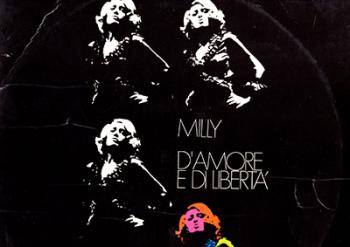
Soldato vestito d'ulivo
(Continues)
(Continues)
Contributed by Bernart Bartleby 2016/11/7 - 21:10
Song Itineraries:
The "Colonels' Dictatorship" in Greece, 1967-1974
Nel '22 sognavo già l'amore

[1961]
Parole di Dario Fo
Musica di Fiorenzo Carpi
Dalla colonna sonora del film collettivo ad episodi “Cronache del '22”.
Scoperto per caso questo piccolo geniale gioiello antifascista...
Parole di Dario Fo
Musica di Fiorenzo Carpi
Dalla colonna sonora del film collettivo ad episodi “Cronache del '22”.
Scoperto per caso questo piccolo geniale gioiello antifascista...
Nel '22 sognavo già l'amore
(Continues)
(Continues)
Contributed by Bernart Bartleby 2016/11/7 - 20:41
Song Itineraries:
Antifa AWS: Militant antifascism
John Hardy (Was a Desperate Little Man)
Anonymous
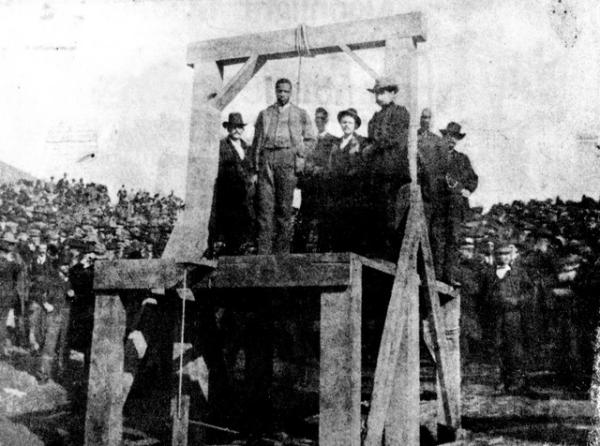
[fine 800]
Una delle più note ballate popolari americane, la cui prima incisione risale al 1924 ad opera di tali Samantha Bumgarner (banjo) ed Eva Davis (voce)
Da allora gli artisti che l'hanno interpretata non si contano: Carter Family, Lead Belly, , Pete Seeger, Joan Baez e tantissimi altri noti e meno noti.
Dato il titolo simile, il contesto geografico ed il tema comuni, quello del lavoro dei negri nella Virginia della seconda metà dell'800, viene spesso confusa e mescolata con un altro standard della musica popolare americana, John Henry
Il testo che propongo è quello reperito sul blog Kidnapping, Murder and Mayhem ed attribuito alla Carter Family che lo incise nel 1928.
La vicenda del minatore negro John Hardy è ben raccontata al link appena citato e anche sul bel sito Executedtoday, dedicato alla pena di morte e ai mille modi e motivi con cui nei secoli alcuni uomini hanno preteso... (Continues)
Una delle più note ballate popolari americane, la cui prima incisione risale al 1924 ad opera di tali Samantha Bumgarner (banjo) ed Eva Davis (voce)
Da allora gli artisti che l'hanno interpretata non si contano: Carter Family, Lead Belly, , Pete Seeger, Joan Baez e tantissimi altri noti e meno noti.
Dato il titolo simile, il contesto geografico ed il tema comuni, quello del lavoro dei negri nella Virginia della seconda metà dell'800, viene spesso confusa e mescolata con un altro standard della musica popolare americana, John Henry
Il testo che propongo è quello reperito sul blog Kidnapping, Murder and Mayhem ed attribuito alla Carter Family che lo incise nel 1928.
La vicenda del minatore negro John Hardy è ben raccontata al link appena citato e anche sul bel sito Executedtoday, dedicato alla pena di morte e ai mille modi e motivi con cui nei secoli alcuni uomini hanno preteso... (Continues)
John Hardy, he was a desperate little man,
(Continues)
(Continues)
Contributed by Bernart Bartleby 2016/11/6 - 22:31
Last Train To Nuremberg

Una strofa aggiuntiva apparsa su Broadside #104
Go tell all the young people; go tell all the
(Continues)
(Continues)
2016/11/6 - 17:16
You Want It Darker

In You Want It Darker, Leonard Cohen sings “Hineni, hineni; I’m ready, my lord," which was Abraham's response when God called on him to sacrifice his son Isaac. It is also the name of a prayer of preparation and humility, addressed to God, sung by the cantor on behalf of the congregation on Rosh Hashanah. At the Oct 13, 2016 L.A., press event, Leonard talked about using "hineni" in the lyrics of his new album's title song to reference a "willingness to serve" that is - in the right circumstances - universal to humanity.
That–Hineni, that declaration of readiness no matter what the outcome, that’s a part of everyone’s soul. We all are motivated by deep impulses and deep appetites to serve, even though we may not be able to locate that which we are willing to serve. So, this is just a part of my nature, and I think everybody else’s nature, to offer oneself at the moment, at the critical... (Continues)
That–Hineni, that declaration of readiness no matter what the outcome, that’s a part of everyone’s soul. We all are motivated by deep impulses and deep appetites to serve, even though we may not be able to locate that which we are willing to serve. So, this is just a part of my nature, and I think everybody else’s nature, to offer oneself at the moment, at the critical... (Continues)
2016/11/5 - 11:10
Sognando

Svensk översättning av Riccardo Venturi
5. november 2016 01:35
5. november 2016 01:35
I MINA DRÖMMAR
(Continues)
(Continues)
2016/11/5 - 01:38
La ballata del Pinelli [Ballata dell'anarchico Pinelli, o Il feroce questore Guida]
![La ballata del Pinelli [Ballata dell'anarchico Pinelli, <i>o</i> Il feroce questore Guida]](img/thumb/c2300_130x140.jpeg?1328916656)
Versione in esperanto (al minuto 32:08).
leoskini 2016/11/4 - 14:15
Which Side Are You On?
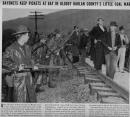
Broadside #57, Aprile 1965
Note: This new set of words to the Kentucky miner's song of the 1930's, was brought to Broadside by Len Chandler in the fall of 1964 when he returned from a summer of activity in the Freedom Hovement in Mississippi. It was sung extensively there and recently by the Selma, Alabama, marchers
Tune: Which Side Are You On by Mrs. Florence
Note: This new set of words to the Kentucky miner's song of the 1930's, was brought to Broadside by Len Chandler in the fall of 1964 when he returned from a summer of activity in the Freedom Hovement in Mississippi. It was sung extensively there and recently by the Selma, Alabama, marchers
Tune: Which Side Are You On by Mrs. Florence
Come all you bourgeoise black men
(Continues)
(Continues)
Contributed by dq82 2016/11/4 - 11:14
Please Settle in Viet Nam

Hopkins recorded the song "Please Settle in Viet Nam" in Berkeley, California, under the direction of Chris Strachwitz (the founder of the Californian label Arhoolie Records), on 20 May 1969, for the session which produced the album Lightnin' (Poppy Records # PYS-60,002). But the song did not appear on the album. Strachwitz released "Please Settle in Viet Nam" on this single (Joliet # 205) and then later on the album Lightning Hopkins in Berkeley (Arhoolie # 1063). (1) Hopkins wanted to see "an ending to the war" and called on the government to settle the Vietnam issue. It also included a little twist. Hopkins said that his girlfriend actually had a man fighting in the war, and that he hoped "he'll stay forever" in the army, because he did not "want to leave that girl". This idea is similar to the "jody" theme - a mythical man in blues and jazz tunes who seduced the wives and girlfriends... (Continues)
My mama prayed, she said please let that kingdom come
(Continues)
(Continues)
Contributed by dq82 2016/11/4 - 10:57
Song Itineraries:
War in Viet Nam as seen from the U.S.
Talking Vietnam Blues

1965
Broadside #56, March 1965
Broadside #56, March 1965
I guess you all heard about the Vietcong
(Continues)
(Continues)
Contributed by dq82 2016/11/4 - 10:41
Song Itineraries:
War in Viet Nam as seen from the U.S.
Il giorno di San Patrizio

Gianni Sartori
24 MAGGIO 2016 8:27
Un altro aspetto da considerare, ben più grave dei tentativi di appropriazione indebita da parte fascista di personaggi di sinistra (come Bobby. Sands o Barry Horne) è la possibile infiltrazione nei movimenti di liberazione o di emancipazione sociale. Se in Italia è relativamente nota la figura dell’infiltrato Mario Merlino nel movimento anarchico, non va dimenticato che elementi legati all’Aginter Presse si infiltrarono (con false credenziali “maoiste” e antimperialiste) nel movimenti di liberazione delle colonie portoghesi per eliminarne i dirigenti (v. Mondlane e Cabral, forse anche la dissidente sudafricana R. First). Da segnalare poi il ruolo dei neofascisti (NAR, ma non solo) a fianco dei falangisti maroniti contro i palestinesi. Non esattamente il massimo della coerenza da parte di soggetti che in Italia si inventavano sigle “terceriste” come OLP... (Continues)
24 MAGGIO 2016 8:27
Un altro aspetto da considerare, ben più grave dei tentativi di appropriazione indebita da parte fascista di personaggi di sinistra (come Bobby. Sands o Barry Horne) è la possibile infiltrazione nei movimenti di liberazione o di emancipazione sociale. Se in Italia è relativamente nota la figura dell’infiltrato Mario Merlino nel movimento anarchico, non va dimenticato che elementi legati all’Aginter Presse si infiltrarono (con false credenziali “maoiste” e antimperialiste) nel movimenti di liberazione delle colonie portoghesi per eliminarne i dirigenti (v. Mondlane e Cabral, forse anche la dissidente sudafricana R. First). Da segnalare poi il ruolo dei neofascisti (NAR, ma non solo) a fianco dei falangisti maroniti contro i palestinesi. Non esattamente il massimo della coerenza da parte di soggetti che in Italia si inventavano sigle “terceriste” come OLP... (Continues)
Gianni Sartori 2016/11/4 - 09:10
Двадцатый век
Двадцатый век прошел, скромны его итоги:
(Continues)
(Continues)
Contributed by A.Grishin 2016/11/4 - 08:18
Ночь летнего солнцестояния

Двадцать первого числа,
(Continues)
(Continues)
Contributed by A.Grishin 2016/11/4 - 08:05
Песня про низкорослого человека, который остановил ночью девушку возле метро «Электрозаводская»

Девушка, эй, постой!
(Continues)
(Continues)
Contributed by A.Grishin 2016/11/4 - 07:59
Цветы на могиле

Средняя Рогатка - исторический район на юге Санкт-Петербурга (между ст. метро "Московская" и "Звездная". В 1941-1944 гг. там проходила вторая линия обороны Ленинграда. За годы блокады район сильно пострадал, там не осталось ни одного здаия довоенной постройки. В 1960-70-гг. там был построен большой жилой район.
Srednaya Rogatka - Historical area in the south of St.-Petersburg (between metro stations "Moscovskaya" and "Zvezdnaya"). In 1941-1944 there lied the second defensive front of Leningrad.
Years of war strongly changed a district, there left no one of prewar constructions. In 1960-70th there was built a big residential community.
Srednaya Rogatka - Historical area in the south of St.-Petersburg (between metro stations "Moscovskaya" and "Zvezdnaya"). In 1941-1944 there lied the second defensive front of Leningrad.
Years of war strongly changed a district, there left no one of prewar constructions. In 1960-70th there was built a big residential community.
На фронт трамвай уходил...
(Continues)
(Continues)
Contributed by A.Grishin 2016/11/4 - 07:45
Над киностудией свирепствует зима

Над киностудией свирепствует зима.
(Continues)
(Continues)
Contributed by A.Grishin 2016/11/4 - 07:31
Der Zoologe von Berlin

Chanson allemande – Der Zoologe von Berlin – Frank Wedekind – 1899 – Ernst Busch – 1964
Paroles de Frank Wedekind (1864-1918), écrivain, dramaturge et chansonnier, un des principaux précurseurs du Kabarett allemand. Du recueil intitulé « Die vier Jahreszeiten », publié à Munich en 1905.
Interprétée par Ernst Busch, dans « Spottlieder », disque entièrement dédié aux chansons de Wedekind, publié en Allemagne Démocratique en 1964.
La ballade Im Heiligen Land que Wedekind publia en 1898 dans la revue satirique Simplicissimus lui valut la condamnation pour lèse-majesté, et la majesté n’était rien moins que le Kaiser Guillaume II. Si bien que Wedekind, en même temps que son ami Heine, illustrateur de la revue, firent sept mois de prison. « Le zoologue de Berlin » est une réflexion sur cette mesure de censure et d'intimidation à laquelle, évidemment, Wedekind ne se plia pas…
Dialogue maïeutique
Cette... (Continues)
Paroles de Frank Wedekind (1864-1918), écrivain, dramaturge et chansonnier, un des principaux précurseurs du Kabarett allemand. Du recueil intitulé « Die vier Jahreszeiten », publié à Munich en 1905.
Interprétée par Ernst Busch, dans « Spottlieder », disque entièrement dédié aux chansons de Wedekind, publié en Allemagne Démocratique en 1964.
La ballade Im Heiligen Land que Wedekind publia en 1898 dans la revue satirique Simplicissimus lui valut la condamnation pour lèse-majesté, et la majesté n’était rien moins que le Kaiser Guillaume II. Si bien que Wedekind, en même temps que son ami Heine, illustrateur de la revue, firent sept mois de prison. « Le zoologue de Berlin » est une réflexion sur cette mesure de censure et d'intimidation à laquelle, évidemment, Wedekind ne se plia pas…
Dialogue maïeutique
Cette... (Continues)
LE ZOOLOGUE DE BERLIN
(Continues)
(Continues)
Contributed by Marco Valdo M.I. 2016/11/3 - 22:45
Letter From the Draft Board

A letter has come to me, darling
(Continues)
(Continues)
2016/11/3 - 20:59
Song Itineraries:
War in Viet Nam as seen from the U.S.
Le déserteur

INGLESE / ENGLISH / ANGLAIS [1] - John Brunner
Broadside #50 september 1964
Boris Vian, poet, novelist, amateur jazz trumpeter and left-wing activist, died - I believe in 1959 - at the comparatively early age of 45. His best-known works are a novel about race prejudice, "J' Irai Cracher sur vos Tombes" (I will Spit on your Graves)' from which an extremely bad movie was made just before his death, and this song, a protest against the Algerian war. It was recorded very successfully by the Algerian singer Mouloudji, but was banned by the French government and withdrawn in both printed and recorded versions; we first heard it in Sweden (translated very well, I'm told), and then on discovering its origin attempted without success to locate a copy in France, Belgium or Britain. The French text was eventually supplied to us by some pacifists in Lyons; I prepared the translation and my wife Marjorie... (Continues)
Broadside #50 september 1964
Boris Vian, poet, novelist, amateur jazz trumpeter and left-wing activist, died - I believe in 1959 - at the comparatively early age of 45. His best-known works are a novel about race prejudice, "J' Irai Cracher sur vos Tombes" (I will Spit on your Graves)' from which an extremely bad movie was made just before his death, and this song, a protest against the Algerian war. It was recorded very successfully by the Algerian singer Mouloudji, but was banned by the French government and withdrawn in both printed and recorded versions; we first heard it in Sweden (translated very well, I'm told), and then on discovering its origin attempted without success to locate a copy in France, Belgium or Britain. The French text was eventually supplied to us by some pacifists in Lyons; I prepared the translation and my wife Marjorie... (Continues)
The Deserter
(Continues)
(Continues)
Contributed by dq82 2016/11/3 - 16:55
Friedenslied
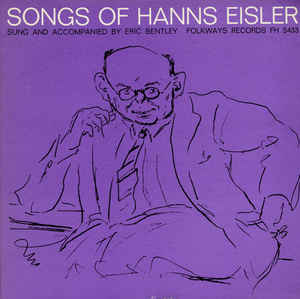
1964
Eric Bentley / Hanns Eisler – Songs Of Hanns Eisler
Broadside #49, agosto 1964
The starting point of this song is a Spanish lyric by Neruda. This was rendered into German by Brecht. The English words are E. Bentley's, the music is Eisler's and is sung and played by Eric Bentley on a new Folkways release, Songs Of Hanns Eisler.
Eric Bentley / Hanns Eisler – Songs Of Hanns Eisler
Broadside #49, agosto 1964
The starting point of this song is a Spanish lyric by Neruda. This was rendered into German by Brecht. The English words are E. Bentley's, the music is Eisler's and is sung and played by Eric Bentley on a new Folkways release, Songs Of Hanns Eisler.
Peace to the house that is mine;
(Continues)
(Continues)
Contributed by dq82 2016/11/3 - 15:55
×
![]()


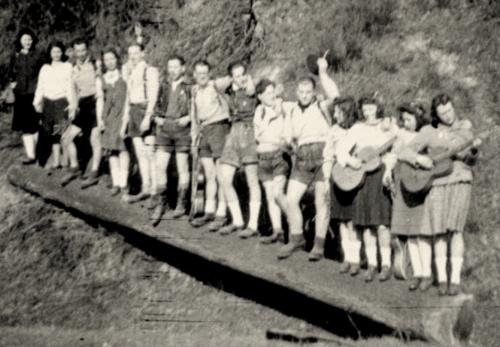
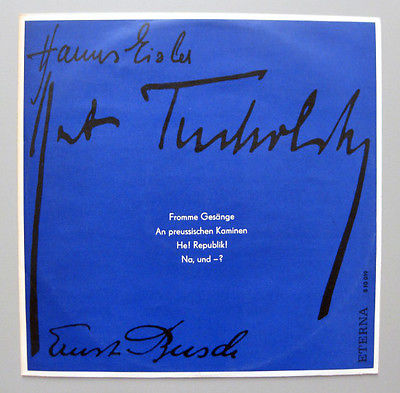



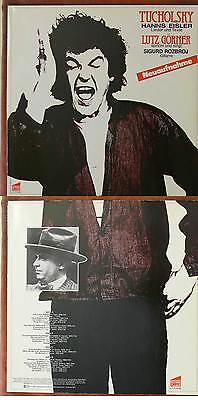





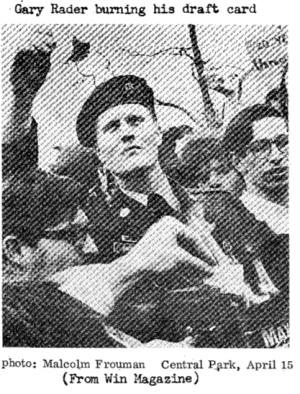
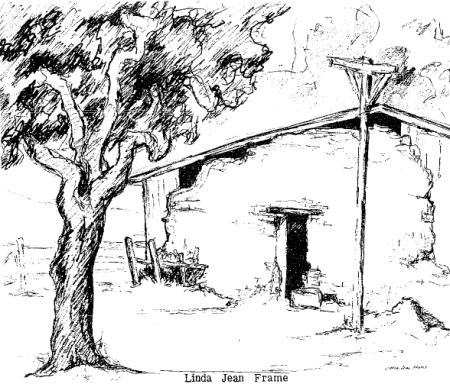



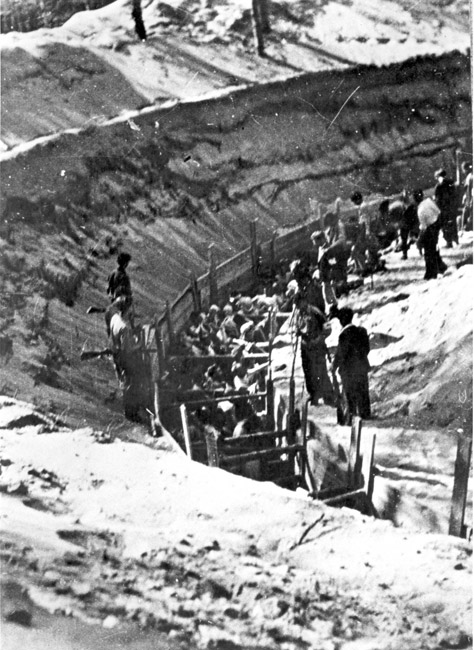
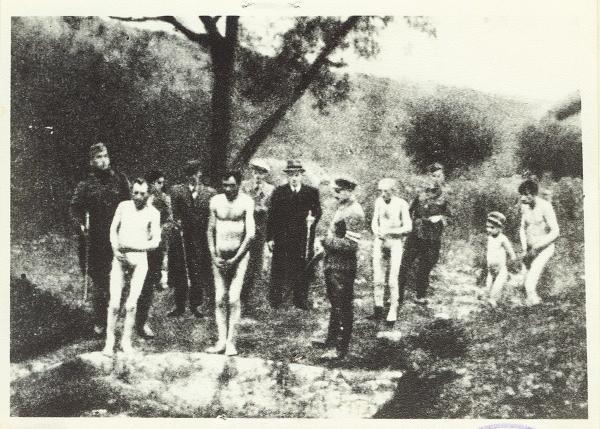
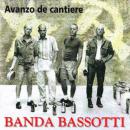
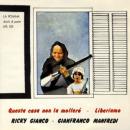

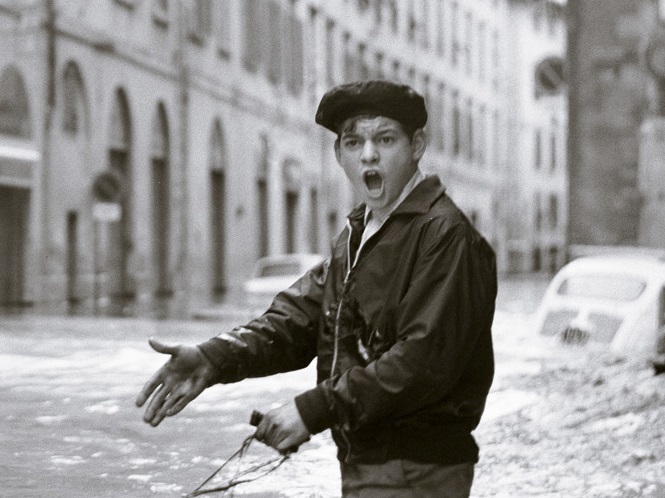
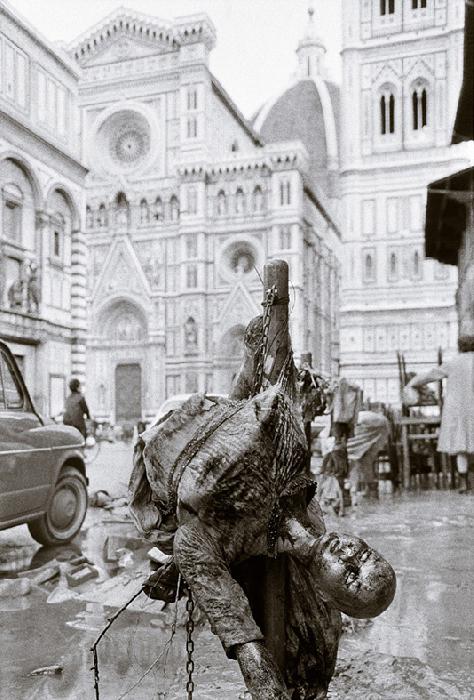
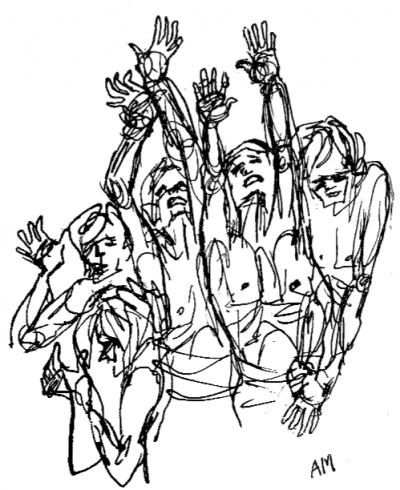
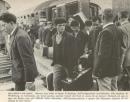
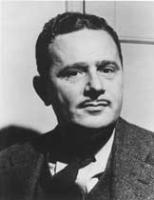

Scritta da Mario De Luigi Jr (classe 1944, giornalista, negli anni 70 fondatore con Sergio Lodi della casa di produzione discografica Divergo, direttore fino al 2014 della rivista "Musica e Dischi" fondata nel 1945 dal padre Aldo Mario) e da un altro autore sconosciuto che si firmava come Sinandro. Sono gli stessi autori di Gridalo nel buio
Nel disco di Carla Mignone, in arte Milly (1905-1980) intitolato “D'amore e di libertà”, pubblicato nel 1972.